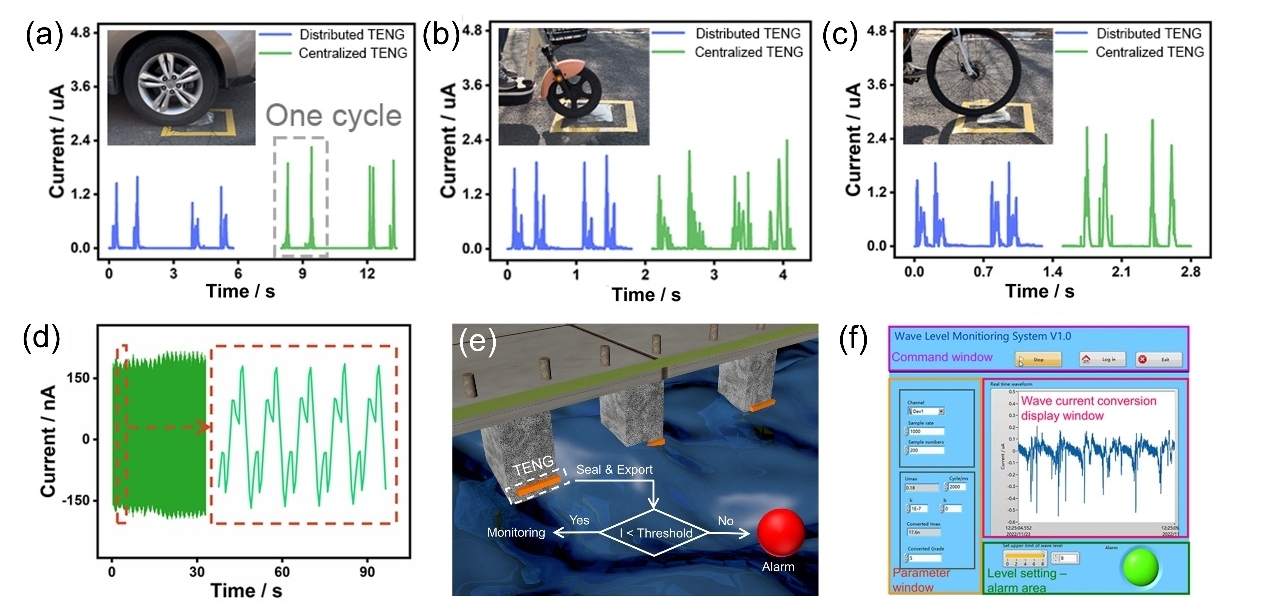Corrosion causes significant losses to various industries. Cathodic protection is used to protect the steel in the marine structures. However, to further reduce the energy consume, the traditional cathodic protection needs to be improved.
Triboelectric nanogenerators (TENG) converts mechanical energy into electricity based on triboelectrification and electrostatic induction. Undoubtedly, TENG-cathodic-protection is in line with the requirements of contemporary low-carbon energy conservation.
Recently, the research team led by Prof. WANG Xiutong from the Institute of Oceanology of the Chinese Academy of Sciences (IOCAS) has proposed a strategy for collecting mechanical energy in transportation systems applying to cathodic protection via sponge TENG.
The study has published in Advanced Functional Materials (IF=19.0) on Aug. 03.
TENG made of highly elastic and pressure-resistance sponge can adapt to forceful impacts in land and water transportation, and can be extended to any shape for harvesting wave and mechanical energy.
Polydimethylsiloxane (PDMS) sponge is modified by polydopamine and Ti3C2 nanosheet, the output of which increases by 236% and the output of which is higher than many other sponge TENGs at the same size. In addition, polydopamine significantly prolongs the lifespan of Ti3C2.
PDMS possesses excellent pressure-resistance ability and PDMS sponge could withstand hundreds of vehicle passes without deformation. The force sensitive sponge TENG can be used to monitor wave grade in the simulating wave environment, which can reflect the wave grade by output. A relative monitor software was designed.
Sponge TENG is used to collect mechanical energy and applied for protecting metal, making the metal materials enter a thermodynamic stable state.
"We have tried several slat particles as the sacrificial templates for the PDMS sponge, K2HPO4 is the most suitable template for the 3D interconnected structure. It's interesting for a flexible but strong sponge to harvesting energy and as a force sensor," said Dr. XU Hui, the first author of the study.
"We believe that green and environmentally friendly TENG protection technologies can truly be applied in the sea," added Prof. WANG, corresponding author of the study.
The work was supported by the fund of the National Key Research and Development Plan of China, the Key R&D Program of Shandong Province, China, etc.

Fig. 1 The energy harvesting of sponge in road and water transportation

Fig. 2 The schematic of sponge-TENG-powered anti-corrosion system
Hui Xu, Xiutong Wang*, Youbo Nan, Hui Zhou, Yan Wu, Mingxing Wang, Weilong Liu, Jizhou Duan, Yanliang Huang, Baorong Hou. (2023). Flexible Sponge-Based Nanogenerator for Energy Harvesting from Land and Water Transportation, Advanced Functional Materials.
(Text by XU Hui)
Media Contact:
ZHANG Yiyi
Institute of Oceanology
E-mail: zhangyiyi@qdio.ac.cn
(Editor: ZHANG Yiyi)

